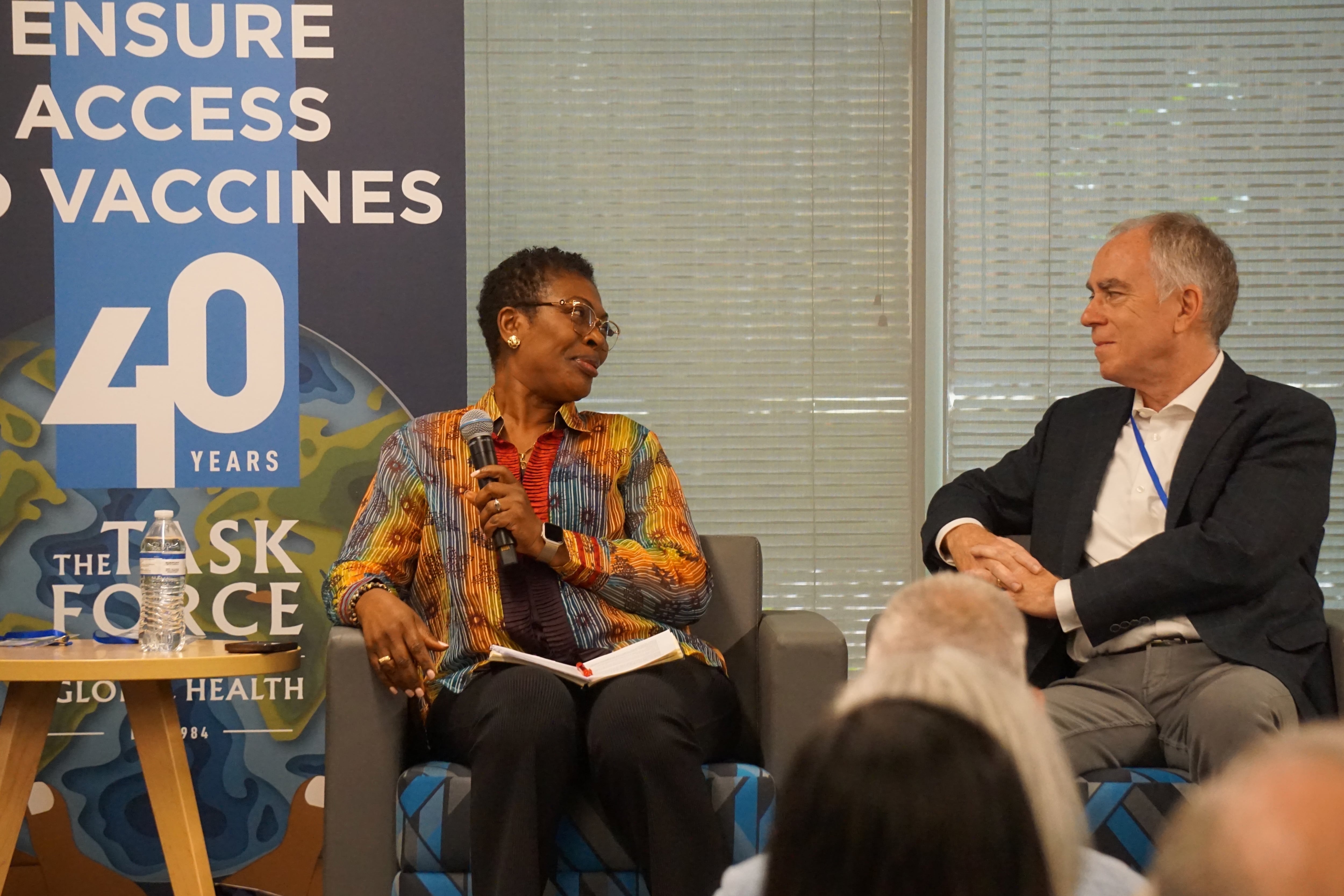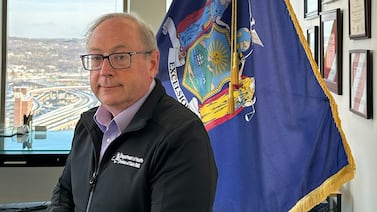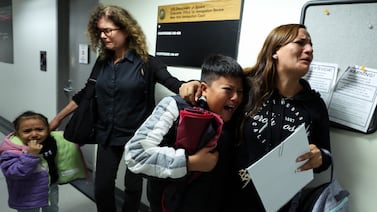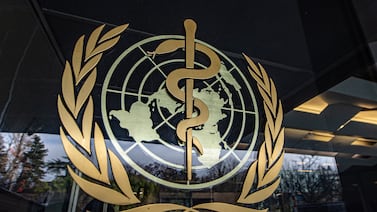Public health, explained: Sign up to receive Healthbeat’s free Atlanta newsletter here.
Sudden cuts to U.S. global health aid this year have hit Atlanta-based international nonprofits hard, spurring layoffs of close to 1,000 workers, and imperiling their mission to help millions of people access food and life-saving health services.
A program that trained thousands of health and nutrition workers in Bangladesh is “going down the drain,” said Joyce Sepenoo, senior director of global health programs at CARE. Programs that are helping countries like Uganda nearly eliminate river blindness have lost funding, said Dr. Kashef Ijaz of The Carter Center.
They are among leaders of four Atlanta global health organizations affected by cuts implemented by the Trump administration since taking office in January.
The suddenness of cuts to the U.S. Agency for International Development caused far more disruption than was necessary, said Dr. Patrick O’Carroll, president and CEO of The Task Force for Global Health.
“Many countries said, ‘If you told us this was going to happen, and you gave us five years to do that, we could have done a pretty good job, and it’s really in our interest to do so’,” O’Carroll said. “But this happened so suddenly.”
In March, U.S. Secretary of State Marco Rubio said the government was canceling 83% of the programs at USAID. “The 5,200 contracts that are now cancelled spent tens of billions of dollars in ways that did not serve, (and in some cases even harmed), the core national interests of the United States,” Rubio said in a March post on X.
Atlanta’s global health leaders disagree.
Tropical diseases like trachoma, a bacterial eye infection, or even malaria could come back here if they are not well-controlled overseas, Ijaz said.
Reducing diseases globally is good for America’s security, too, Ijaz said, because it helps improve economies and political stability in other countries.
Here’s a rundown of where things stand at five large global health organizations based in Atlanta.
CARE: Aid to 18.4M people terminated
Cooperative for Assistance and Relief Everywhere was founded in 1945 in the wake of World War II to put together food and life-saving items for people in war-torn Europe: care packages. Since then, it has dramatically expanded its scope to a range of humanitarian projects around the world and moved its headquarters to Atlanta in 1993.
CARE lost $165 million in direct federal funding – mostly from USAID, since the start of the year, said spokesperson Michael de Vulpillieres. The organization received a total of just over $903 million in revenue for the year ending June 30, 2024, according to its financial statements.
The loss of funds resulted in layoffs: 850 full-time workers cut from a total workforce of about 7,400. Most of those positions were in other countries, but 110 U.S.-based workers also lost their jobs. Contract positions have also been cut, de Vulpillieres said.
All told, 46 programs in 30 countries that reached an estimated 18.4 million people have been terminated, he said.
Those include:
- health programs and food distribution programs in Sudan, where “a protracted famine is taking hold,” according to the World Food Programme
- health and nutrition services to mothers and children in Bangladesh
- health programs in the eastern part of the Democratic Republic of Congo
- Programs to provide services to survivors of violence in Honduras and Guatemala
“Our program in Bangladesh trained and invested in over 50,000 workers, and it’s all going down the drain,” Sepenoo said during an Oct. 4 panel discussion at the Decatur Book Festival. “The world is coming to a place where we all need to shout on top of our voices and say we are so connected that the impact of these things in one country affect all of us.”
Carter Center helps fill gaps in U.S. aid
The Carter Center receives only about 9% of its funding from the federal government, so it hasn’t been hit as hard as others, Ijaz said. There have been no layoffs in its health programs.
Still, Ijaz is worried about how countries like Uganda, which is very close to eliminating river blindness, and Ethiopia, which has the highest burden of trachoma in the world, will continue to make progress because other nonprofits working there have lost significant funding.
“If you miss one mass drug administration for prevention of trachoma in a population at risk, you basically put the program back two years,” Ijaz said. As in many countries, the effort in Ethiopia relies on drugs donated from pharmaceutical company Pfizer. Those could expire if they are not administered on schedule.
“All those gains which were made, they can be reversed,” Ijaz said. The Carter Center is trying to help “meet the moment” by drawing on its own resources to fill the gap left by U.S. aid cuts, including providing $5 million to partner organizations for trachoma elimination in Mozambique, which is close to eliminating the disease, and continuing its own work in Ethiopia.
“We want to reach the finish line and finish the job, and this is our contribution, in this larger ecosystem of partnerships, collaboration and relationship, to fill in those gaps,” Ijaz said.
The Task Force for Global Health finds workarounds for some programs
The Task Force for Global Health is the “world’s longest-running pharmaco-philanthropy,” O’Carroll said during the book festival panel. Much of the organization’s work focuses on managing drug donations from pharmaceutical companies for diseases like river blindness and trachoma to countries around the world.
The Task Force, founded in 1984 and headquartered in Decatur, has had to lay off staff, spokesperson Jessica Wurst said, though she declined to say how many people. It also lost funding for a USAID-funded neglected tropical disease program in early 2025 aimed to improve how sub-Saharan governments and organizations prevent and treat diseases like river blindness.
The $45 million award involved a partnership with the Kwame Nkrumah University of Science and Technology in Ghana and an African research network, according to a 2024 news release.
The Task Force’s partners have found workarounds in the short-term, Wurst said. Pfizer donates the medication for trachoma, and nongovernmental organization partners stepped in to ensure that drugs were distributed before they expired.
Still, Wurst said, that’s only a short-term solution, and the organization is concerned about next year because about 40% of the areas that need the trachoma drugs were funded by the U.S. government.
Other funding streams have remained intact, Wurst said. Those include efforts to support national programs to dramatically reduce intestinal worm infections in several countries, including Bangladesh and Malawi, work on polio eradication in the remaining countries where outbreaks persist, and providing support for viral hepatitis elimination.
Merck and GSK donate drugs for lymphatic filariasis and river blindness, and so far none of those drugs have expired, Wurst said. Countries that lost USAID funding are “pursuing alternative solutions to sustain progress toward elimination.”
In the United States, The Task Force is watching what Congress will do to the U.S. foreign aid budget. “Some cuts that have been proposed would diminish our country’s ability to prevent future pandemics, manage outbreaks, and maintain the infrastructure of health systems across the globe,” Wurst said. “These losses weaken global capacity to fight diseases that continue to threaten lives worldwide and jeopardize American safety.”
Atlanta’s public health ‘anchor’: the CDC
O’Carroll likened the Centers for Disease Control and Prevention to the “anchor store” in a mall because it is the cornerstone of Atlanta’s global health work.
The agency has been rocked by multiple rounds of layoffs this year, most recently on Oct. 10. The CDC formerly had offices in more than 60 countries, according to its website.
Funding for malaria prevention was canceled, and 27 workers in sub-Saharan Africa were recalled to the United States earlier this year, Politico reported. Staffers who focused on global HIV and TB in the Global Health Center were terminated in April.
After the United States withdrew from the World Health Organization in January under an executive order from President Donald Trump, CDC staffers were instructed to stop communicating with the organization.
Trump’s proposed fiscal year 2026 budget would, if approved, cut funding for the CDC’s Global Health Center by more than half, from $693 million to $293 million, according to the CDC Data Project.
“CDC is funded by U.S. tax dollars to protect the health of Americans, but there is no way to protect the health of Americans and turn a blind eye to global health,” O’Carroll said.
The CDC Foundation is an independent nonprofit created in 1995 to fill “gaps in what CDC could do,” Brandon Talley, chief program and foundation officer, said at the book festival. The foundation has domestic and international programs and has worked in more than 100 countries.
Federal funding cuts have primarily impacted the foundation’s domestic work, said Amy Tolchinsky, associate vice president for communications.
The organization received Covid-19 supplemental funding from the federal government that was not renewed. It was using that money to support state and local public health agencies in hiring CDC Foundation staff members to work on local health needs, so when the funding ended, 90 staffers were laid off.
The foundation also laid off 32 additional people who work in the United States due to a decrease in other federal funds, Tolchinsky said.
Rebecca Grapevine is a reporter covering public health in Atlanta for Healthbeat. Contact Rebecca at rgrapevine@healthbeat.org.







